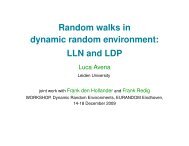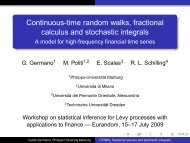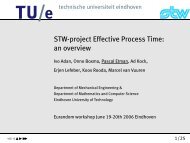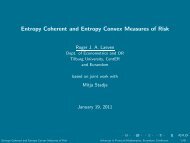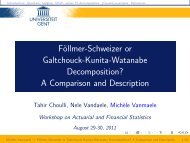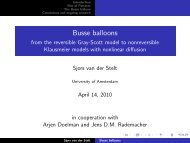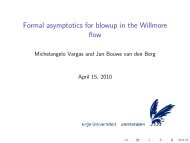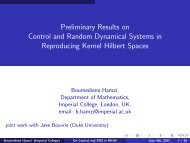EURANDOM
EURANDOM
EURANDOM
You also want an ePaper? Increase the reach of your titles
YUMPU automatically turns print PDFs into web optimized ePapers that Google loves.
The titles, abstracts, slides and lecture notes of these talks and lectures can be found at<br />
http://www.eurandom.tue.nl/workshops/2009/YEPVI/YEpVI_abstracts.htm .<br />
Sponsors: Eindhoven University of Technologie, Thomas Stieltjes Institute for Mathematics, Netherlands<br />
Organization for Scientific Research (NWO)<br />
May 11-13, 2009 (SIM)<br />
Climate Change and Extreme Value Theory<br />
Organizers:<br />
Wilco Hazeleger, KNMI<br />
Geurt Jongbloed, TU Delft & <strong>EURANDOM</strong><br />
Jef Teugels, KU Leuven & <strong>EURANDOM</strong><br />
Arnoldo Frigessi, University of Oslo<br />
Participants: 55<br />
The earth's climate can be characterized by a number of parameters. E.g. annual regional averages of<br />
temperature and rainfall, distribution of rainfall over a year and average wind intensity and direction.<br />
These parameters clearly show variability, depending on the location and time.<br />
It is very important to study the variation in these climate parameters over a longer period of time, especially<br />
trends that indicate non-stationarity of their behaviour are of interest in order to attribute<br />
them to natural or anthropogenic causes. Studying possible causes for these trends, quantitative aspects<br />
of these trends and consequences for human, animal and plant life of these trends is important<br />
for reasons of safety, economy and quality of life for future generations.<br />
Many researchers around the world work on aspects of climate change, e.g. people in climate studies,<br />
oceanography, mathematics, physics, economics etc. The stochastic methods used come from a broad<br />
range of subfields of stochastics, e.g. stochastic modelling, stochastic simulation, inverse problems, stochastic<br />
processes, extreme value statistics, curve estimation, time series analysis etc.<br />
This workshop focuses on extreme value statistics in the context of climate change. The aim is cross fertilization,<br />
communication and interaction between people that work on extreme value statistics and<br />
climate studies.<br />
The first and last day of the workshop were held at <strong>EURANDOM</strong> in Eindhoven, the second day at KNMI<br />
in De Bilt. On Monday there were four invited talks, on Tuesday three and on Wednesday two. On<br />
Tuesday, the group was divided in four subgroups. These groups were given one of two problems (one<br />
proposed by Wilco Hazeleger, KNMI, and one by Richard Smith, UNC) and asked to provide a solution<br />
direction. The groups were constructed in such a way that each group had senior and junior members<br />
as well as members from the field of climate research and statistics. On Wednesday, the groups were<br />
asked to present their results plenary.<br />
The invited speakers were:<br />
Anthony C. Davison, Institute of Mathematics, Ecole Polytechnique Federale de Lausanne, Switzerland<br />
Gabriele C. Hegerl, School of Geosciences, University of Edinburgh, UK<br />
Albert Klein Tank, Climate Research and Seismology, KNMI, The Netherlands<br />
Douglas W. Nychka, National Center for Atmospheric Research Boulder, USA<br />
Rolf-Dieter Reiss, Department of Mathematics, Universität Siegen, Germany<br />
Holger Rootzén, Department of Statistics, Chalmers University of Technology, Gothenburg, Sweden<br />
Richard L. Smith, Department of Statistics and Operations Research University of North Carolina, USA<br />
David B. Stephenson, Department of Mathematics, Exeter Climate Studies, University of Exeter and<br />
Hadley Centre, UK<br />
Andreas Sterl, Climate Research and Seismology, KNMI, The Netherlands<br />
Speakers that unfortunately had to cancel, were<br />
David Battisti, Department of Atmospheric Sciences, University of Washington, Seattle, USA<br />
Arnoldo Frigessi, Department of Biostatistics, University of Oslo, Norway<br />
Sidney Resnick, School of Operations Research and Information Engineering, Cornell University, USA<br />
Hans von Storch, Meteorological Institute, University of Hamburg, Germany<br />
Excluding the speakers and two organizers, the participants were from The Netherlands (22), UK (8),<br />
Sweden (2), Norway (1), Estonia (1), Poland (2), Bulgaria (1), Canada (1), Germany (2), Argentina (1),<br />
<strong>EURANDOM</strong> Annual Report 2009 26



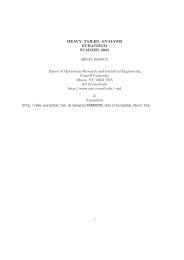
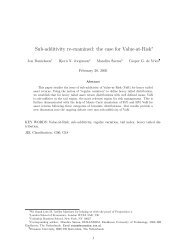
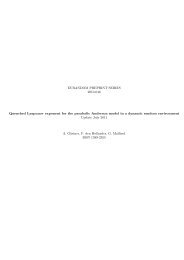
![The Contraction Method on C([0,1]) and Donsker's ... - Eurandom](https://img.yumpu.com/19554492/1/190x143/the-contraction-method-on-c01-and-donskers-eurandom.jpg?quality=85)
